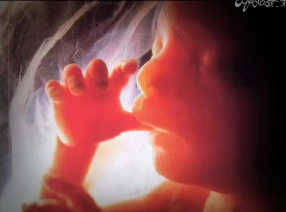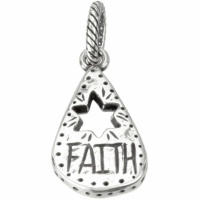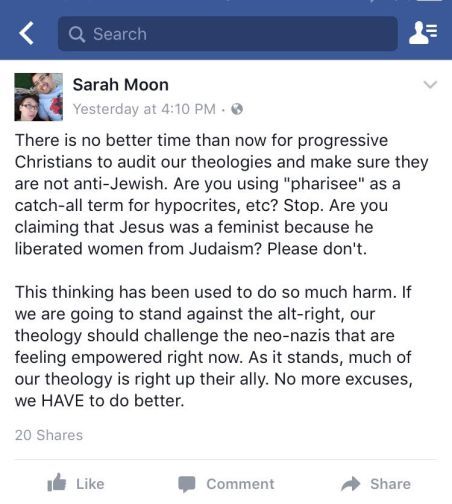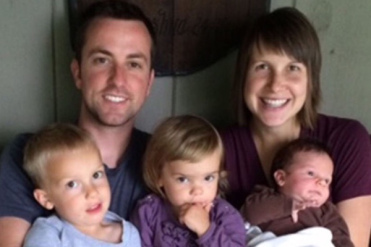Sarahbeth Caplin's Blog, page 31
December 1, 2016
The trip to the ER that changed my mind about outlawing abortion

The trip to the ER that changed my mind
 I don’t like writing about abortion. I don’t have much original content to share in that debate, but I figure you can never hear enough personal stories, which are far more effective in changing minds than ranting in the rabbit hole of Facebook comment threads.
I don’t like writing about abortion. I don’t have much original content to share in that debate, but I figure you can never hear enough personal stories, which are far more effective in changing minds than ranting in the rabbit hole of Facebook comment threads.
To be clear, I’ve never had an abortion. Thanks to the pill, I’ve never had to even consider one. But I had an experience a few years ago that heavily swayed my thinking. I haven’t stopped calling myself pro-life, but I’m a different sort of pro-lifer now than I used to be.
What I mean is, I’ve stopped elevating the life of the fetus over that of the mother.
(Some squicky details about periods ahead, which probably isn’t necessary since women’s bodies aren’t squicky, but here’s a warning anyway).
In the winter of 2013, I started what seemed like a heavier period than usual. I wasn’t on the pill yet, and heavy periods were pretty normal for me. An irregular cycle was also not unusual, so it didn’t strike me as odd that this bleeding was happening six weeks after my previous period. What was unusual was the number of tampons used up in just under an hour: six, to be exact. Six of the Super Plus kind, which typically last anywhere from three to six hours depending on where I am in my cycle. And the cramps. My God, the cramps. I’m no stranger to those, either, but not the punched-in-the-gut kind.
I called my then-fiancé, a physician assistant, who advised that I go to the ER. It was around ten o’clock at night, and I was able to be seen pretty quickly. I was given thick cotton pads to sit on while being examined. I’d never seen that much blood before.
The bleeding stopped shortly after I arrived at the hospital, and the pregnancy test came back negative – but given what I’d experienced until that point, the nurse told me it was likely that I wasn’t producing enough of the pregnancy hormone to show a positive test. I’d have been six weeks along, at most. It’s not uncommon for irregular women to suspect they are pregnant after missing at least two periods, whereas I had only missed one.
I share this story because it was the first thing I thought of when I read an article about how Texas will soon require the burial of aborted fetuses. Because most abortions occur within the first eight weeks of pregnancy, this means that the burial contents may well have included those cotton pads I bled on.
It also means that the contents of a miscarriage in a toilet bowl ‘count,’ as not all abortions occur in the operation room of a hospital or clinic. Which means there is no way to rule out the possibility that women who suffer legitimate miscarriages could be suspected of or charged with murder.
For years, I was the kind of pro-lifer who believed that the abortion issue could best be solved if it were treated like other kinds of murder: outlawed in all fifty states, the assailant(s) arrested and thrown in jail. Not until I became a ‘suspect’ (or so I might have been, had this happened in Texas in the not-so-distant future) did I realize the holes in my rhetoric; the vehemently anti-life effect it would have had on countless women, their children, and families. After all, it’s hard for a single mom to pick up her kids from school and feed them if she’s held in custody and can’t afford bail.
This experience may not ever happen to you, which is why it is so important to listen to those who have lived through it. I shut down every opportunity to hear such stories, though – most likely because I marketed myself as an unsafe person with whom to share such a personal thing. But with social media, these stories are all too easy to find, and they deserve to be heard. Women deserve better than this, and for the sake of all future pregnancies, the pro-life movement desperately needs a makeover.
The pro-life movement needs to re-establish itself as a body of people who care about preventing abortion from becoming an option in the first place, by supporting measures that have been proven to work, and ensuring adequate care of all moms and babies, once they leave the womb. A proposed law like this is not interested in the health and well-being of women. Instead, it focuses its energy into shaming women after the procedure has been carried out. The fetus is gone by then – so what is the point?
Shame is the point. Not ‘protecting life.’ Just shaming women.
Filed under: Social Issues Tagged: Abortion, Controversy, social justice








November 22, 2016
Christian anti-Semitism, politics, and me
 A few years ago a Lutheran friend invited me to her weekly bible study when she heard I was shopping for a new church. The denomination’s founder, Martin Luther, was only a name to me at that point; someone who came up in my Elizabethan history books, but was nothing more than an interesting footnote.
A few years ago a Lutheran friend invited me to her weekly bible study when she heard I was shopping for a new church. The denomination’s founder, Martin Luther, was only a name to me at that point; someone who came up in my Elizabethan history books, but was nothing more than an interesting footnote.
Once I learned about his deeply anti-Semitic beliefs (including that all Jews ought to be expelled from Europe), I could not in good conscience bring myself to attend that bible study with the possible intention of one day calling myself a Lutheran, despite knowing my friend shared none of those beliefs.
But anti-Jewish history is more than an unpleasant footnote in Christian history, as I was reminded by this timely Facebook post shared by a friend:

There is no better time than now for progressive Christians to audit our theologies and make sure they are not anti-Jewish. Are you using “pharisee” as a catch-all term for hypocrites, etc? Stop. Are you claiming that Jesus was a feminist because he liberated women from Judaism? Please don’t.
This thinking has been used to do so much harm. If we are going to stand against the alt-right, our theology should challenge the neo-nazis that are feeling empowered right now. As it stands, much of our theology is right up their ally. No more excuses, we HAVE to do better.
For years I struggled to find an answer when friends and family asked me what I ever saw in Christianity that would make me want to convert from Judaism. Save for a few isolated incidents, my childhood was largely spared from anti-Jewish hatred. Instead, I experienced a good deal of ignorance about the Jewish religion from my Christian classmates, which was frustrating, but never made me feel unsafe. I was taught to handle questions such as, “Is Moses the Jewish Jesus?” with patience, as this ignorance was not the fault of my then elementary-aged friends.
The real truth is that I wanted a relationship with God (just don’t ask where I heard that expression from, I really am not sure) and the resources for that weren’t available at my synagogue. But they were available at church.
After a CNN interview in which members of Alt-Right, a white supremacist group, questioned the personhood of the Jewish people, the cognitive dissonance I placed between my faith and Christianity’s anti-Semitic history demanded to be addressed. I can’t un-know these things, nor can I un-know the number of Christians in my life who wave away this history as merely a bug and not a feature of Christianity as a whole. Those people weren’t True Christians™, they’ve told me, which should be obvious, given that their savior was called the King of the Jews.
That Jesus was Jewish, and a descendant of Jews, placated me for a while. The problem is that the movement inspired after his death has been so far removed from his original intent. That movement, and its effect on human history, my history, is what I must look at today. You analyze a movement for what it is, not just for how it started and what it was intended to be.
I am increasingly disturbed by the unwillingness of “nice Christians” who either ignore or casually dismiss this evil in their religion’s roots. Those eager to point out #NotAllChristians are forgetting something critical that God himself made clear: all Christians are part of one Body (1 Corinthians 12:12). And while not all are guilty of antisemitism, Christians cannot shirk responsibility for it. “Taking responsibility” does not mean sharing the burden of guilt, but addressing this evil and reforming the church from the inside.
And now there is something I need to get off my chest: as Christian support for Trump increased, I felt increasingly unwelcome in my church. And now that Trump is our elected president, I feel a deep conflict of loyalty. I am a Christian (albeit an extremely conflicted one), but I was a Jew first. I was reminded again that I am Jewish, at least in terms of ethnicity, at my last doctor’s appointment when I was asked on the intake form if I have any Ashkenazi ancestry.
My Jewishness is one item on a long list of boxes that define who and what I am, and it’s something I honestly don’t know what to do with. Most days I don’t think about it, as I’ve never been an active participant in the Jewish faith, nor do I attend synagogue. But then there are the religious politics that force it to my attention, sending me down a rabbit hole of conflicting ideologies and questions of identity once more.
The Nazis of 1930s Germany did not care about spiritual belief, but blood, as do the Neo Nazis of today. Then and now, I could profess belief in Christ from the rooftops and it would not matter, because the Alt-Right members of Trump’s cabinet only care about my family tree. And here’s the thing about family: they are forever. The Jewish family was my first family, and though I estranged myself from them, they are my family still. And I have an obligation to them still, no matter how much my beliefs have changed, or will change in the future.
Filed under: Social Issues, Theology Tagged: Christianity, Controversy, evangelicals, Judaism, Racism, social justice








November 14, 2016
Political unrest cannot be resolved with bible verses
 Last week, a friend and I were browsing through the Religion section of our favorite independent book store, and I sanctimoniously pulled out all the ones I recently read and loved. My friend graciously accepted all the books I piled into her arms, but stopped to point one out I actually hadn’t read before. It was one of those self-help-meets-devotional kinds of books that, admittedly, I tend to judge pretty harshly.
Last week, a friend and I were browsing through the Religion section of our favorite independent book store, and I sanctimoniously pulled out all the ones I recently read and loved. My friend graciously accepted all the books I piled into her arms, but stopped to point one out I actually hadn’t read before. It was one of those self-help-meets-devotional kinds of books that, admittedly, I tend to judge pretty harshly.
The cover showed a woman wearing a loose-flowing tunic over dark leggings with cute boots (how bad is it that I was tempted to purchase the book because I really liked that cover model’s outfit?) holding a bouquet of flowers, her eyes cast upward toward heaven. It was a book about dealing with rejection, something that has never not been relevant to my life. And yet…I had some doubts (but we both agreed to buy the book).
I thought, rather judgmentally, that I had already read this book – not this specific title, but its ‘type.’ The “successful Pinterest-loving Christian blogger/speaker with a great marriage and a bunch of kids who doubts God’s goodness because of her cellulite” type. The “toss a Bible verse on it and call it fixed” type.
As you can guess, I can’t stand that type. I’ve seen so many of that type posting what they sincerely believe are helpful Facebook posts reminding us all that “God is in control” even if Donald Trump is now our president. Thanks to Facebook’s “On This Day” feature, I’ve been privy to all the times I too wrote posts like these, completely unaware as to how anyone could possibly find them anything but comforting.
My eyes have been opened to a phenomenon I’m not sure what to call other than Privileged Theology. Let me explain.
Privileged Theology is well-intentioned, don’t get me wrong. But in dire circumstances, like when the new president appoints known neo-nazis as his advisors, it isn’t helpful. God is in control…but swastikas are being spray-painted on buildings. God is in control… but immigrant children are being told by school bullies that their parents will be deported. God is in control…but gay couples are fearing that their newly-minted marriages will be overturned.
God was, presumably, in control during the Holocaust, during the lynchings of the 60s, and during 9/11. I’m not, at this point, entirely clear on what God being “in control” actually looks like if it doesn’t prevent innocent people from profound suffering. That’s what people are afraid of, and that’s why this theology isn’t calming anybody down. God’s control may be evident in the bigger picture, but the days that make up the next four years will feel incredibly long, and this line will not help anyone.
It has been my experience that the people who tout this line – myself included – are people who are highly unlikely to be affected by any of the risks a Trump presidency poses on America. This line, from what I’ve observed, comes from the computers of comfortable white, upper middle class Christians as they sip their lattes and prepare for their next speaking gig, or women’s group, or MOPS meeting.
They mean well, no question about that. I have no doubt that they sincerely believe what they say, and it works to assuage their fears about the unknown.
But, to paraphrase another popular Christian blogger, Jen Hatmaker, if it isn’t true for a poor person or an immigrant or struggling single parent, then it isn’t true for anyone.
At this point, no one can make projections about what the next four years will look like. All the experts who analyze election trends for a living were completely wrong about Hillary having this one in the bag, so we really don’t know what to expect anymore. For many people, there will never be a time when faith is needed and depended upon as much as it is now.
But the very legitimate fears minorities feel at this moment will not be soothed by any Facebook post or Bible verse. They will be comforted by the church stepping up and acting like a church, caring for the marginalized in its midst. They will be comforted by the Christians going where I believe Jesus would go: into the gutter with the poverty-stricken and the grieving.
Filed under: Social Issues, Theology Tagged: celebrities, Christianity, Controversy, grief, LGBT, Racism, social justice, Writing








October 21, 2016
Dabbling in doubt: a plea to my church
Weeks ago, it was announced that the next small group study would cover a series of “pressure points” – that is, a series discussing difficult questions and circumstances that cause many Christians to stumble and question their faith, following the Sunday sermon on the same topics.
This announcement felt like an answered prayer. A series for doubters and skeptics to openly discuss their issues? I couldn’t wait to get involved.
Browsing through the study booklet, I quickly realized that this wasn’t quite what I expected. To the church’s credit, the most obvious topics were included: concerns about God’s goodness regarding evil, suffering, and death, issues about sex, etc. Other topics surprised me: “the workplace” (apparently addressing the pressure some Christians might feel when it comes to being open about faith at the office), politics (no explanation required), and parenting (raising godly kids and whatnot).
Maybe my expectations were misplaced. No current atheist I know left his faith because he never got advice about how to proselytize to co-workers.
Of course, for many people, these are relevant topics, and they deserve to be addressed. My concern has to do with mis-marketing, and the injustice of cramming topics like suffering and loss into one night as part of a six-week long series. The reality is, a topic like suffering could go on for weeks, months even, and is relevant enough to just about everyone’s lives that it really deserves its own study series. Furthermore, the guiding discussion questions – “How is Jesus a model for suffering?” “How do you handle suffering?” – may be the questions that the church staff thinks we have, but those aren’t the questions that I have.
The way the discussions were structured didn’t allow for much diversity. Each group had the right to go off the grid and launch their own discussion based on the individual needs of its members, but at the end of the night, that was it. Next week the sermon would cover a different issue, and we were supposed to move on. That toughie could now be checked off the list, it’s been ‘solved,’ and we don’t have to dwell on it anymore.
It’s not the first time I’ve seen a “tough topics” course structured like this.
For people like me toeing the line of agnosticism, this method of “study” is a bit of a tease. It promises to go deep, when one sermon per subject just barely scratches the surface of the issue. One sermon per week will bring up questions that deserve more mulling over than one follow-up discussion can allow, and I would leave feeling quite bereft.
Have you ever played with a cat using one of those plastic sticks with a feather at the end? You dangle it over the cat’s head, teasing them by bringing it close and then pulling it away, as they hilariously jump and try to catch it.
 When this series was announced, I’m sure my face looked something like this.
When this series was announced, I’m sure my face looked something like this.That’s what a series like this feels like to me. I commend my church for addressing doubt, I really do – but the actual execution leaves much to be desired.
Furthermore, there’s another troubling aspect of the Doubt Issue that I need to address. A little doubt, like what we see in Abraham, Joshua, and other biblical patriarchs, is all well and good…but only if it resolves neatly and doesn’t lead to something really drastic, like leaving the faith altogether. My friend Cassidy explains it well in an old blog post:
Doubt is much like mourning; after a certain period of time, the mourner’s and the doubter’s friends and family get a little tired of hearing about it and stop being able to show sympathy or support for the mourner or doubter.
Every single doubter who comes to the wrong conclusion, or who otherwise doesn’t follow the standard approved narrative for doubters, is a contradiction of Christianity’s teachings about doubt–which is, itself, probably the biggest reason why Christians both desperately ache to be thought of as friendly toward doubt and yet also are completely hostile and dishonest about engaging with doubt. They are perfectly aware that doubt leads to deconversions so of course they want to address the problem, but they also can’t really engage with it in a way that actually would lead to honest inquiry and sincere examination–because both would quickly unearth a number of reasons to reject most of the childishly over-simplistic doctrines of evangelicalism.
I want to have better expectations of my church, but a sermon series like this really makes me…well, doubt.
This isn’t to say that pastors should only teach about doubt, and I realize that it’s impossible to cater to the individual spiritual needs of all 10,000+ members in attendance (yeah, it’s a big church). But a big church like this has plenty of resources. What about an on-going support group of sorts, for people to come and have a safe space to express thoughts and ask questions they’d get reprimanded for in bible study? A space where “You’re not a real Christian” isn’t allowed, because we’re all in different places on the journey, and only God can determine who is “real” anyway. A place without specific structure – no discussion manuals, no pre-written questions – just open, honest discussion and encouragement. Often, I’m not looking for answers so much as an affirmation: You’re not alone. There’s nothing wrong with you.
Or how about this: conduct an anonymous survey to find out what the congregation’s real struggles are, rather than just assuming them. Structure sermons around the results.
For anyone who’s ever felt like they’ve given the “wrong” answer in bible study, what we need is a support group – not another sermon series. And like Alcoholics Anonymous, what is said in the room stays in the room – for many people, expressing doubt is a serious offense that can risk being disowned by relatives, so privacy would be absolutely paramount.
Week after week, I continue showing up, hoping to hear something – anything – that will make me feel fed. I cannot be blamed for lack of trying. But showing up week after week, feeling pushed further and further into the margins because my concerns are not others’ concerns, and I must not be “doing faith” correctly, will not guarantee my presence forever.
Like this post? Check out Confessions of a Jew-ish Skeptic, now available on Amazon.
Stay in touch via Facebook and Twitter.
Filed under: Theology Tagged: agnosticism, cats, censorship, Christianity, Controversy, self-care, Spiritual Abuse








October 19, 2016
WWAMAD? What Would a Mature Adult Do?

I was adamantly pro-life in college (and by “adamantly,” I mean “anyone who has an abortion is an evil sadist who deserves a life sentence in prison,” without any ounce of empathy for the circumstances that lead to abortion being an option in the first place: namely poverty). I had a friend who was very pro-choice. In fact, she interned at Planned Parenthood. By agreeing never to discuss abortion, we were able to sustain a friendship – a friendship so close that she stood next to me on my wedding day.
I look back on this as a reminder that I am capable of agreeing to disagree, to live and let live. Sometimes this is very hard to do, but it is nonetheless what mature grownups do. Grownups understand that people believe different things, often due to unique life experiences, and we respect their right to do so. I imagine most of us would rather not live in an echo chamber – I certainly don’t.
WWAMAD? has been my mantra this election season: What Would a Mature Adult Do? I repeated this question for every pro-Trump post I saw on Facebook; every “But Hillary is just as bad!” and “He just tells it like it is!” post. I could overlook these comments, even as I shook my head or rolled my eyes, because I’m not an ardent Hillary fan, despite believing she’s the more qualified candidate. In fact, I do think she is a very flawed candidate, and my reaction to her electoral win (let’s face it, it’s pretty inevitable at this point) will be rather anti-climactic.
But this post isn’t about Hillary.
It’s about the moment I saw posts, comments, and shared articles from a handful of acquaintances, past and present (and many of them Christian), continuing to laud Trump even after a recording that bragged about assaulting women was released to the media. Even after news surfaced that he had raped his former wife, was accused of raping a teenage girl (true, we can’t prove guilt beyond reasonable doubt, but he’s making his accusers look awfully credible), and made disturbing comments about what he would do to his own daughter if she weren’t his daughter. Even after multiple women came forward to accuse him of assaulting them. And no, “Sorry if you were offended” does not count as an apology – in no way does it acknowledge that the original statements were wrong and never should have been said.
Worse yet are the women and men alike reiterating that Trump’s comments were nothing more than “locker room talk.” I’m outraged that women don’t hold the men in their lives to higher standards than this, and mystified at the small number of men I know who have come forward to stand up for their gender and insist that this is not acceptable.
I’m outraged, anxiety-ridden, and triggered. Two weeks ago I broke my months-long sobriety streak because I couldn’t handle the stress (if you’ve never experienced it yourself, then let me tell you: PTSD is a real bitch).
It’s hard to explain how much of a gut-punch it is to hear in conversation or read Facebook posts from people who know about your past – people who might have told you they believe you, and insisted that what happened to you wasn’t your fault – and still find a way to excuse confessions of assault as “guy talk,” “lewd comments,” or my favorite, “mean things.” At this point, a line has been crossed. We are no longer in the land of “agreeing to disagree” when sexual assault is involved. No, this time, it’s too personal to do that.
What Would a Mature Adult Do?
I’ve talked to my husband, my brother, and a few close friends. I’ve prayed about my response. There is no right or wrong answer to this question; not if it’s answered after a great deal of reflection and humility. For me, as a mature adult (so I hope), it is best to act in the interest of self-care. If anyone’s posts trivialize what was done to these women (which was also done to me), I don’t need their presence in my life. My recovery matters more.
So I did something I once swore I’d never do, because it just felt petty: I did a clean-up of my friends list. Most of the ‘unfriended’ (I can’t stand that word) were people I haven’t spoken to since high school and will likely never see again, anyway. Others were harder: they are people I see in church, whom I cannot avoid without being overtly rude. Short of finding another church, which is not a simple thing to do, I had to repeat the question again: What Would a Mature Adult Do?
A mature adult, I figure, will still be kind and courteous in public spaces, but will not go out of her way to meet for coffee or outside-of-church activities. Those will have to rest.
I don’t intend for this to be permanent. But when trust has been broken, the only thing that can close the gap is time. Hopefully, if the offenders are also mature adults, they will understand why this separation is necessary.
Like this post? Check out Confessions of a Jew-ish Skeptic, now available on Amazon.
Stay in touch via Facebook and Twitter.
Filed under: Feminism, Social Issues Tagged: Abortion, celebrities, Controversy, depression, Donald Trump, Feminism, grief, rape culture, self-care, social justice








October 5, 2016
The identity I’m not obligated to explain
The other day I had an existential crisis in the Religion section of Barnes and Noble. No matter how much the doubts build up, I can’t stay away from the words of apologetic preachers and theologians. Each time I walk through those aisles, I hope my eye will catch sight of a title that will clarify things for me, or at the very least, help bring back a spark.
I walked past titles of books recommended to me in college; books that came to me in such perfect circumstances, I wondered if God deliberately put me in that particular space with that particular person so I would receive the book not one moment later. I remember devouring words and chapters that fed me and gave me life. Several years later, rereading those words is like finding stale pretzels under the couch.
Something wasn’t working. The words hadn’t changed, so obviously that something that “wasn’t working” had to be me.
Hours earlier, one of my professors sent me an email to wish me a happy new year, and my heart lit up like I just heard my favorite sermon. And it confused me, because never in my life have I made a big deal out of Rosh Hashanah. In fact, my father died on Rosh Hashanah, so it’s definitely not a highlight on my calendar anymore.
It was more the camaraderie of the greeting, a shared secrecy. Not many people know what this holiday means, but she did, and she knew I did too. I was part of an “in” group, even if it’s a small one.
Maybe that’s it: it’s the feeling of camaraderie that I miss. Pair any number of Christians together, and you never know what you’re going to get. Sometimes not even a mutual declaration of love for Jesus is enough to ease the strain of disagreement about issues like abortion, homosexuality, works-based or faith-based salvation, old-earth or young-earth creation. You can’t expect complete homogeneity in any religion, really, but there is one thing I can generally count on when in the presence of other Jews: a shared understanding of what it is to be different. To hear politicians rattle on about a “Christian nation” and feel like they’re leaving you out, or worse, that they’re implying you don’t belong here.
Even after adopting a new faith, I never ceased feeling like an outsider. Suddenly my Jewishness, my “otherness,” stood out like a bright cell phone screen in a dark theater, and I wasn’t even doing anything to make it obvious. I still chafed at the thought of Jesus being the only way to heaven. Still dreaded not having anything to do on Christmas; still felt like a Grinch who would rather stick forks in her ears than hear yet another carol (hymns are good, though).
I have bobbed and weaved around this question for years: What do I do about Judaism? It’s like it’s destined to follow me, regardless of the fact that I’ve actually never been a practicing Jew. I have no plans to start, but it’s a staple of my identity just like my blue eyes and “coffee stain” birthmark.
I don’t have to “do” anything about it, but it’s there anyway. It will throb under my skin any time I hear Christian-ese language that reeks of exclusivity, of intolerance, and implies eternal torment for those outside the tribe. It’s my knee-jerk reaction to mass condemnation of LGBT people, and my internal battle cry of Do you have any idea what it’s like to be a minority?!!
Interestingly, I believe Jesus does. But to believe in Jesus and remain indecisive about everything else that goes with him – the exclusivity, the eternal separation from God without him – well, I’m pretty allergic to cognitive dissonance. I’d prefer a little more stability if I’m going to pledge my allegiance to anything.
A few hours after I left Barnes and Noble, I saw this meme on Facebook:

Life is so much simpler
when you stop explaining yourself to people
and just do what works for you.
It’s a very simple statement. It’s not deep, it’s not complicated, it’s not much. Yet it was just what I needed to hear in my moment of excruciating anxiety (and I’m not exaggerating: I’ve lost sleep over this “I don’t know what I am!” dilemma), because the fact is that God knows what I am. He knows and understands the constant battle of “in-between-ness.” It’s other people who put the stress on me to have An Answer, a definitive label that everyone can recognize: Christian. Jew. Agnostic. Whatever. For some reason, I’ve been caring too much about what others will think: “She’s a walking contradiction!” being the worst possible pronouncement.
Somehow I got it in my head that it’s not okay to say, “I’m figuring things out.” It’s even more okay to say, “I’d rather not discuss this.” I’m more than willing to talk about it, but if a situation feels unsafe, then I won’t.
I’ve always been free to turn down dates with men I’m not interested in, right? Why did it never occur to me that I’m free to do the same with religion-themed discussions that feel uncomfortable?
Maybe my real issue is not “What do I do about [insert religious conundrum here]?” but rather, “What do I do about establishing boundaries?”
Like this post? Check out Confessions of a Jew-ish Skeptic, now available on Amazon.
Stay in touch via Facebook and Twitter.
Filed under: Social Issues, Theology Tagged: agnosticism, Christianity, Controversy, Judaism, self-care








September 15, 2016
When home is a hell-bound handbasket
Lately, longing on to social media reminds me of the time I picked up the front doormat to shake off the dust and dirt – and discovered a family of spiders underneath. Perhaps the people I know (or thought I knew) had racist, intolerant underpinnings all along, but there was never an opportunity or purpose in showing those qualities until this election. Suddenly, doormats are lifted everywhere, exposing ugliness that once was considered inappropriate to air in public, and it’s all okay. It’s free speech, after all. It’s American.
I haven’t been okay lately. As naïve as it may be in this day and age to consider any space a “safe space,” the truth is that I always thought America was one of the most progressive places on earth. I believed that my country was the embodiment of true democratic justice. And yet, this month the convicted Standford rapist Brock Turner served only three months of his already laughable six-month prison sentence. He’s a free man now, but I’ve seen more furious posts about Colin Kaepernick’s protest against the national anthem. I’ve seen posts insisting that “racism isn’t as bad as it used to be” and rape victims should just keep their knees together. A police officer was fired for not firing his gun.
Only in America?
I’m so emotionally worn out to the point of apathy. I’m edgy, restless, and depressed that the places and people I thought were safe are turning out to be toxic. I’m just plain tired.
I’m especially jaded by self-professing Christians refusing to put on a different pair of lenses and see the world through others’ eyes. Quite honestly, I’m terrified of people who claim to worship a refugee with minority status, and yet cheer enthusiastically at the prospect of electing a man who wants to build a wall to keep them out. I’m scared and anxious to the point of chronic nausea and fatigue, yet still I tell myself, This is America, this can’t happen here.
And I don’t even have it as badly as others do; I’m merely an observer of this chaos, feeling small and ineffective. I want to do something, and shut myself down with “What’s the point?” The people who have the most power to make positive change are using it for evil instead, and it seems they are winning. What good can I do?
I can’t change the world, but I can take better care of myself, so at least I am in good condition to make changes when the opportunity arises. I can drag my tired self into the shower and eat healthy meals. I can read good books. I can light candles and drink tea. I can go back to writing handwritten notes of encouragement and mail them out to friends who won’t be expecting them. I can cuddle my adorable cats, who believe the world is their catnip-laced oyster.
I can make the world better by first making myself better. And that’s all I can handle for right now. I’ve used my platform to speak out against injustice in the past, only to be met with hateful, trolling comments in return, effectively scaring me away from speaking out again (at least in the near future). But it’s not as if I didn’t know that speaking up has consequences; I was just ill-prepared to handle them. I want to be counted as one of the “good guys” on the right side of history, but I’m not quite the brave activist I thought I was. I’m not sure what else I can do.
Part of my self-care regimen is allowing myself to return to my childhood love of choreography. Fight Song by Rachel Platten has taken on personal meaning for me, and I’m so proud of the progress I’ve made with the first 60 seconds of the song (just please ignore Siri’s “low battery” warning in the middle).
Filed under: Social Issues Tagged: censorship, Christian culture, Christianity, Controversy, depression, evangelicals, Facebook, grief, rape culture, self-care, social justice








August 31, 2016
But what if I want the box?
Last year I took part in an interfaith dinner, in which all the campus religious groups cooperated and hosted an evening of food, learning, and good conversation. It was advised to write your religious affiliation under your name on your nametag, and I saw many amusing ones: “Spiritual but not religious”; “Jesus not religion”; “Don’t really care.” The standard “Christian,” “Jewish,” “atheist” tags were almost…bland.
Last year I put “Christian” under my name. This year I’m not sure what to put, because if you know me, you know that the labels “Jewish,” “Christian,” and “agnostic” are all, in their own way, applicable.
I know better now than to assume uniformity under one label. “Christian” tells me something, and yet not enough. The “Eastern Orthodox” and aforementioned “Jesus not religion” tags create two different images in my mind, as do “atheist” and “agnostic atheist.” All of them are designed to invite conversation, which is the goal, but still I hesitate to get creative in this area.
I appreciate the people who tell me that labels are stupid and limiting; that I don’t need to worry about fitting into anyone’s box. They mean well but they don’t understand how OCD works: I need clean, simple labels. I want the box. The labeled box fits easily into a shelf and looks like it belongs; a container with loose ends hanging out of it is a black hole where items get lost, not found.
Unfortunately, the labels that suit me best are paraphrased quotes, quirky statements, and borrowed lines from books that don’t fit easily onto a Hello, My Name Is tag:
“My doubt is threaded with faith.” “Jew-ish.” “Christian with questions.” “Doubt-filled believer.” “On a journey.” I recently came across this quote, which I love, but definitely wouldn’t fit: “I want the presence of God Himself, or I want nothing to do with religion.”
But they all invite probing questions I might not have answers to. Or, if I do, they come out jumbly, in part because I’m still working through things, and also because I’m allergic to small talk and crowds make me itchy.
And yet, I believe these events are important, and may hold a key – be it a person on a similar trajectory, or insight from listening to another’s abbreviated story – to figuring myself out. I have learned a lot about God from talking with other people. I’ve learned more about the elasticity and purpose of faith by listening or reading someone’s autobiography than hearing a sermon. I hope others react similarly to my story.

“Seeker of God.” “Skeptic.” “Searching.” They’re all me. They don’t fit neatly in one box. I’m willing to bet, though, that behind the cross jewelry, the yarmulkes, and other decorative articles of faith, most people don’t fit neatly in one box, either.
Like this post? Check out Confessions of a Jew-ish Skeptic, now available on Amazon.
Stay in touch via Facebook and Twitter.
Filed under: Theology Tagged: agnosticism, atheism, Christian culture, Christianity, Judaism








August 29, 2016
Putting the answer before the question

Nearly a month after a Nebraskan family of five was killed in a car accident on their way to a missionary training program, Lyn Jerde, a writer for the Telegraph Herald in Iowa, asked the questions that many Christians are asking:
What kind of God would call people to a holy endeavor, then allow them to be wiped out when they answer the call?
If anyone tries to tell me that God “took them home” — including three tiny little children — because “God needed more angels in Heaven,” don’t be surprised if I respond with violence or at least violent words.
Expect a similar reaction to “everything happens for a reason.”
But say, “It’s a mystery,” and I’ll probably respond with, “Amen.”
I agree with her on the mystery part. After years of deep thinking and praying on the subject, I’m inclined to think that tragedies like these aren’t divinely ordained at all, but rather a consequence of the old motto “Shit happens,” and they are just as likely to happen to Christians as they are non-Christians.
I appreciate Jerde’s questions, as they are not popular and not often addressed in church. After her post was shared on Friendly Atheist, the comment thread is being taken over by pointed inquiries about Jerde’s concluding statement: “I will continue believing that God is good.”
On the one hand, as a person of faith myself, I find that a noble endeavor. On the other hand, these response questions are perfectly valid:
How can you claim to honestly wrestle with those questions if you have already decided on a conclusion before even asking?
I appreciate all the introspection, Lyn, but your conclusion was the ultimate non-sequiter. Despite it all, you continue to believe in a good God? Why?
If you are absolutely certain that your religion is the true one, this ceases to be an issue. You know that you are working with a limited amount of knowledge based on what you’re able to see of the stage from peeking through the curtain; you don’t have the full range of view and context that the audience has, and your doubts will be addressed soon enough.
Then again, there is something highly coincidental about claiming your religion as “true” when it happens to be the one you were born into…and the most socially acceptable religion in your country of origin. And if you’ve never taken the time to research and eliminate other religions based on reliable evidence.
Therefore I don’t agree or disagree with the responses to Jerde’s piece, and turn the question back to my readers: is starting with a conclusion before even asking the question an intellectually honest thing to do? Why or why not?
See also: “God will never forsake you”
The limits of divine intervention
Filed under: Social Issues, Theology Tagged: Christian culture, Christianity, evangelicals, grief











